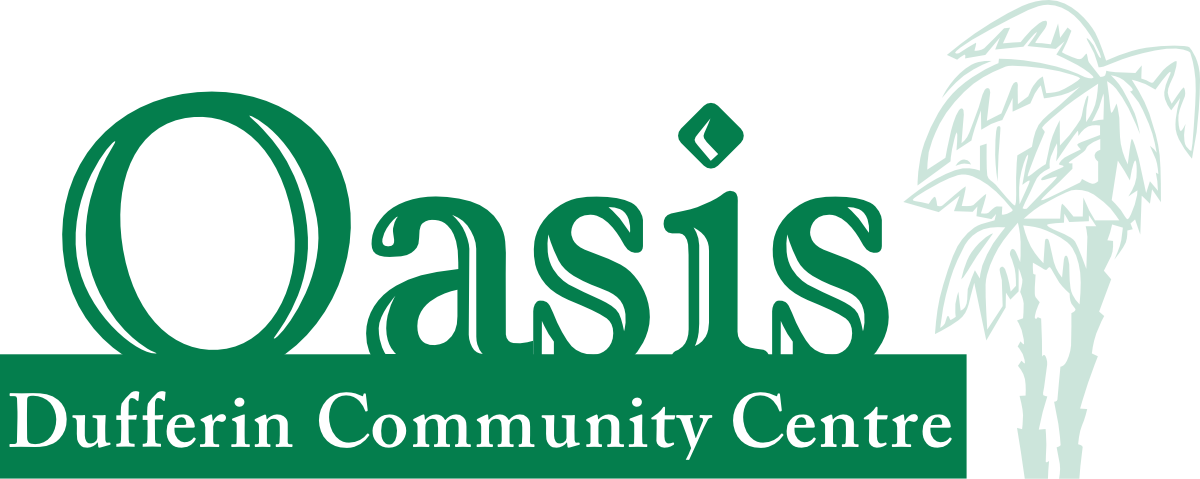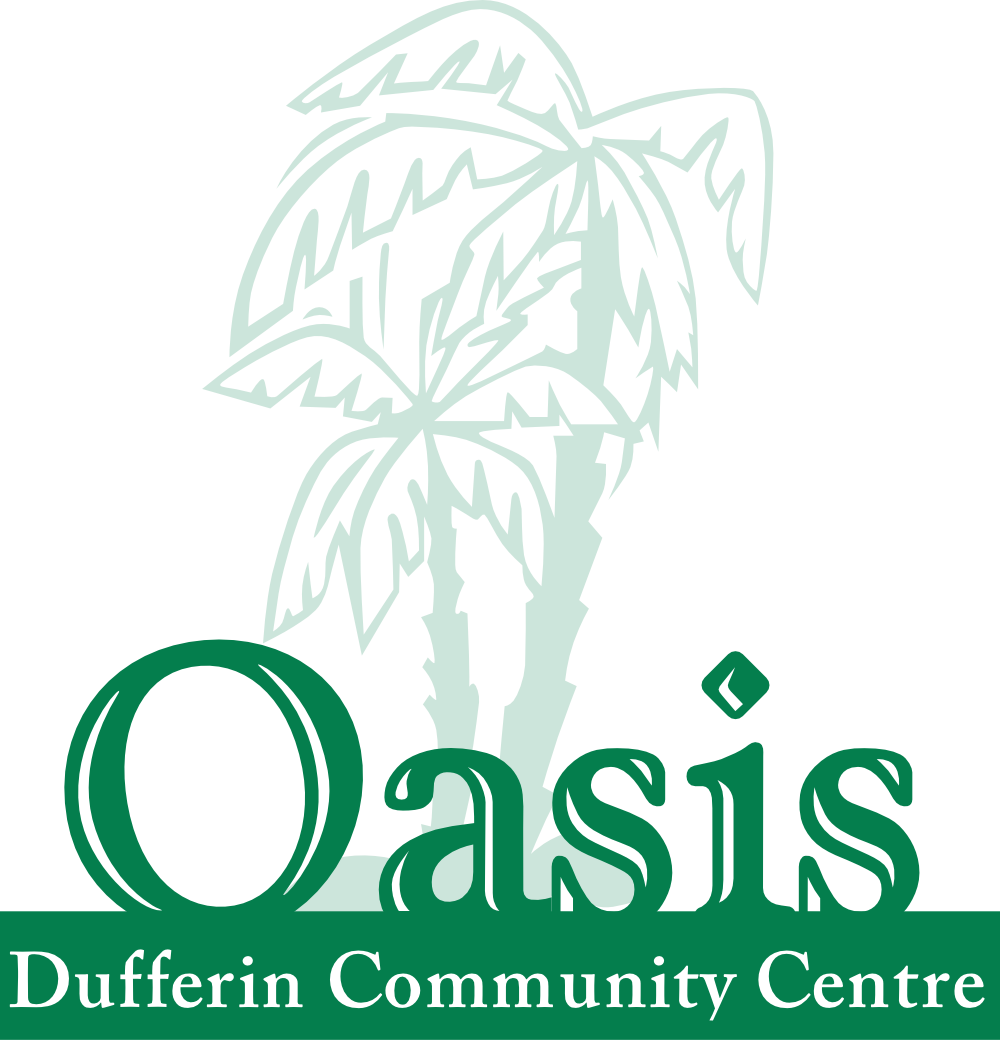Privacy of personal information is an important principle to Oasis Dufferin Community Centre. We are committed to collecting, using and disclosing personal information responsibly and only to the extent necessary for the services we provide. We also raise awareness about what we do and connect with our donors and supporters. We also try to be open and transparent as to how we handle personal information. This document describes our privacy policies.
Contents
What is Personal Information?
Who We Are
Primary Purpose of Collecting Personal Information
Related and Secondary Purposes
Protecting Personal Information
Retention and Destruction of Personal Information
Your Information
Contact Information
1. What Is Personal Information?
Personal information is information about an identifiable individual. Personal information includes information that relates to their personal characteristics (e.g., gender, age, income, home address or phone number, ethnic background, family status), their health (e.g., health history, health conditions, health services received by them) or their activities and views (e.g., religion, politics, opinions expressed by an individual, an opinion or evaluation of an individual). Personal information is to be contrasted with business information (e.g., an individual's business address and telephone number), which is not protected by privacy legislation.
2. Who We Are
The Oasis Dufferin Community Centre is a not-for-profit Christian charity that provides services to our community such as a food bank, a community drop in and dinner, women's counselling, seniors programs, volunteer recruitment and support, and employment opportunities. As the Oasis Dufferin Community Centre does not engage in commercial activities, it is not covered by the Personal Information and Protection of Electronic Information Act. Some of our counselling services may be covered by the Personal Health Information Protection Act.
3. We Collect Personal Information: Primary Purposes
About Community Members
We collect, use and disclose personal information in order to serve our community members. This would include information related to their eligibility for food bank services, information about their needs and possibility for referrals, to provide counselling and contact information.
It would be rare for us to collect any personal information without the community member's express consent, but this might occur in a case of urgency (e.g., the community member is in need of assistance) or where we believe the community member would consent if asked and it is impractical to obtain consent (e.g., to make a referral).
About Members of the General Public
For members of the general public, our primary purpose for collecting personal information is to raise awareness about what we do and, sometimes, to raise funds. We may also collect personal information in the course of offering special events (e.g., signing up for the event, thank you notes).
On our website, we only collect, with the exception of cookies (electronic markers identifying computers that have previously visited our website), the personal information you provide and only use that information for the purpose you gave it to us (e.g., to respond to your email message, to register for a course, to subscribe to our newsletters). Cookies are only used to help you navigate our website and are not used to monitor you.
About Staff, Volunteers, and Service Providers
For people who are contracted to do work for us (e.g., staff), our primary purpose for collecting personal information is to ensure we can contact them in the future (e.g., for new assignments, reminders of volunteer opportunities) and for necessary work-related communication (e.g., sending out paycheques, year-end tax receipts, tax filings). Examples of the type of personal information we collect for those purposes include home addresses and telephone numbers. We also provide references for staff, volunteers and service providers and maintain work records to enable us to provide accurate information. It is rare for us to collect such information without prior consent, but it might happen in the case of a health emergency (e.g., an outbreak of a contagious disease) or to investigate a possible breach of law (e.g., if a violent incident were to occur at Oasis).
4. We Collect Personal Information: Related and Secondary Purposes
Like most organizations, we also collect, use and disclose information for purposes related to or secondary to our primary purposes. The most common examples of our related and secondary purposes are as follows:
To record donations and provide receipts for the same.
To advise community members, staff, volunteers, service providers, supporters, donors and members of the public of what we do.
Oasis reviews community member and other files for the purpose of ensuring that we provide high quality services, including assessing the performance of our partners and staff. In addition, external consultants (e.g., auditors, lawyers, information technology) may on our behalf do audits and continuing quality improvement reviews of Oasis, including reviewing community member files and interviewing our staff.
We maintain the usual financial records (bookkeeping, banking) that may contain some personal information.
Funding agencies have the right to review our files to ensure that their funds were spent in accordance with the purpose of the funds. This may include a review of the services we provide to community members, staff and volunteers.
Like all organizations, various government agencies (e.g., Canada Customs and Revenue Agency, Information and Privacy Commissioner, Human Rights Commission, etc.) have the authority to review our files and interview our staff as a part of their mandates (although, the solicitor and client privilege restricts their access to much of this information). In these circumstances, we may consult with professionals (e.g., lawyers, accountants) who will investigate the matter and report back to us.
Community members or other individuals we deal with may have questions about the services they received. We also provide ongoing services for many of our community members over a period of months or years for which previous records are helpful. We retain this information for a minimum of seven (except that counselling program records are retained for 10 years) years after the last contact to enable us to respond to those questions and provide these services.
5. Protecting Personal Information
We understand the importance of protecting personal information. For that reason, we have taken the following steps:
Paper information is either under supervision or secured in a locked or restricted area.
Electronic hardware is either under supervision or secured in a locked or restricted area at all times. In addition, passwords are used on computers.
Paper information is transmitted through sealed, addressed envelopes or boxes by reputable companies.
Sensitive electronic information is transmitted either through a direct line or is anonymized or encrypted.
Staff is trained to collect, use and disclose personal information only as necessary to fulfill their duties and in accordance with our privacy policy.
External consultants and agencies with access to personal information must provide us with appropriate privacy assurances.
6. Retention and Destruction of Personal Information
We need to retain personal information for some time to ensure that we can answer any questions you might have about the services provided and for our own accountability to external regulatory bodies. However, we do not want to keep personal information too long in order to protect your privacy.
We keep our client files for a minimum of seven years (except that counselling program records are retained for 10 years).
We destroy paper files containing personal information by shredding (for counselling records we keep track of the records we have destroyed). We destroy electronic information by deleting it and, when the hardware is discarded, we ensure that the hard drive is physically destroyed or destroyed by suitable software.
Our counselling files are secured so that only the registered health care practitioner(s) providing the services have access to them. Non-registered staff would only have access to the information in the case of an emergency (e.g., fire).
7. You Can Look at Your Information
With some exceptions (e.g., risk of harm to yourself and others), you have the right to see what personal information we hold about you. Often all you have to do is ask. We can help you identify what records we might have about you. We will also try to help you understand any information you do not understand (e.g., short forms, technical language, etc.). We will need to confirm your identity, if we do not know you, before providing you with this access. We reserve the right to charge a nominal fee for such requests.
If there is a problem, we may ask you to put your request in writing. If we cannot give you access, we will tell you within 30 days if at all possible and tell you the reason, as best we can, as to why we cannot give you access.
If you believe there is a mistake in the information, you have the right to ask for it to be corrected. This applies to factual information and not to any professional opinions we may have formed. We may ask you to provide documentation that our files are wrong. Where we agree that we made a mistake, we will make the correction and notify anyone to whom we sent this information. If we do not agree that we have made a mistake, we will still agree to include in our file a brief statement from you on the point and we will forward that statement to anyone else who received the earlier information.
8. Do You Have a Question?
Our Information Officer can be reached at:
Sofia Pazmino
Oasis Dufferin Community Centre
1219 Dufferin Street,
Toronto, Ontario,
M6H 4C2
Tel: 416-536-4431
sofia@oasisdufferin.org
They will attempt to answer any questions or concerns you might have.
If you wish to make a formal complaint about our privacy practices, you may make it in writing to our Information Officer. They will acknowledge receipt of your complaint; ensure that it is investigated promptly and that you are provided with a formal decision and reasons in writing.
If your concerns are about counselling records, the contact information for the Privacy Commissioner of Ontario is as follows:
Information and Privacy Commissioner of Ontario
2 Bloor Street East, Suite 1400
Toronto, ON M4W 1A8
info@ipc.on.ca
416-326-3333

